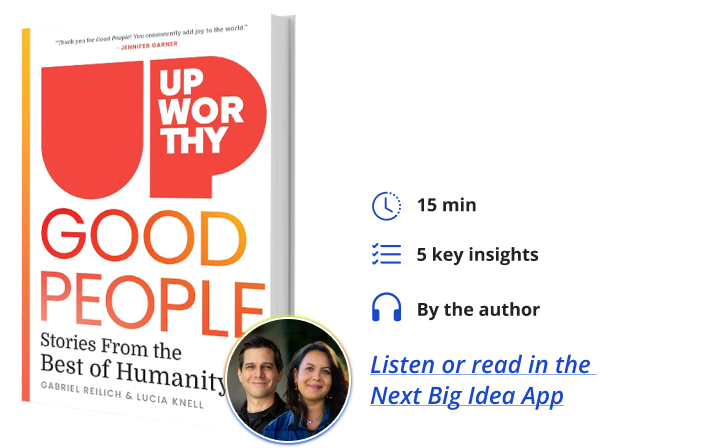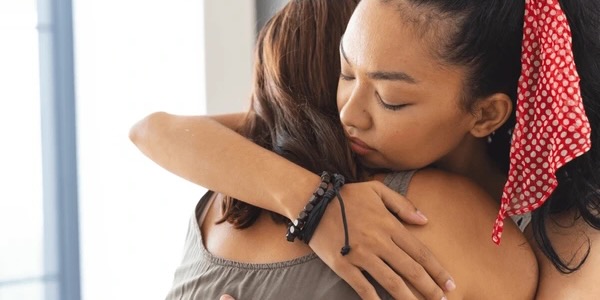Gabriel Reilich is Head of Content & Innovation at Upworthy. He led the company’s transformation into a global social media brand.
Lucia Knell is Upworthy Vice President, where she made the company into one of the most beloved brands on the internet based on her belief that media can be used to unite people.
Below, co-authors Gabriel and Lucia share five key insights from their new book, Good People: Stories From the Best of Humanity. Listen to the audio version—read by Gabriel and Lucia—in the Next Big Idea App.

1. Don’t underestimate the impact of everyday kindness and connection.
There’s a common misconception that it takes a grand gesture to change someone’s life: requiring lots of money, time, or energy. The reality is that powerful interactions of decency exist in everyday moments. From a random compliment to just asking someone if they’re okay, the impact these moments have is profound; meaningful enough for someone to remember years or even decades later. Small act, big impact.
Seemingly innocuous interactions can change how someone sees the world. Take the story “Curly Fries,” for example. John, a homesick Coast Guard enlistee, was headed back to his base after visiting family, and not exactly looking forward to it. It’s a long, tiring journey, and craving human contact as much as food, he stopped at a diner in Texarkana.
There, he made a spur-of-the-moment connection with another diner over a funny t-shirt, and that led to a conversation. That conversation resulted in something much bigger for John. He walked away with a greater understanding of the world and about people. That’s where the magic is, because that memory helped John through some of his most difficult times.
People share stories like this every day on Upworthy, and there is a beautiful variety of them in Good People. It speaks to an overlooked truth about how we move in the world. Every interaction is an opportunity for a profound shift in perspective. Realizing this raises the stakes of human interaction and adds a layer of beauty. You may never know when you were that person for someone, a stranger or friend who said or did the right thing at the right time. But knowing that it happens with regularity is a beautiful part of being alive. And the best part? It doesn’t require much effort. It just requires seeing people as people.
A great sense of power and agency comes with this. No algorithm, talking head, or politician ultimately controls how you interact with someone in real life. It’s just you and another person at that moment in time. Simple gestures may not be lifesaving in a traditional sense, but they can be emotionally lifesaving, providing comfort when it is desperately needed. Anyone can be a source of kindness. Intentional, instinctual interactions may result in a moment that holds profound power for the rest of someone’s life.
2. Goodness catalyzes goodness.
The impact of a kind gesture isn’t limited to the recipient. Kindness can be contagious. Shout out to Skye’s pursuit of public surface law and the tow hitch Harriet carries in her Jeep. But the ripple effect doesn’t end there.
Simply witnessing examples of the better angels of our nature, as Abraham Lincoln put it, can have a far-reaching positive effect. A study by the National Institute of Health surveyed more than 25, 000 participants through eight experimental studies to measure how much their altruism increased upon seeing others engage in kind acts. The results revealed a moderately strong correlation between witnessing altruism and subsequently embodying it as a result. We call this the triple ripple effect. Generosity of the human spirit is positive for the person on the giving end, the receiving end, and anyone who bears witness to the act. We’re prosocial creatures, and it’s a beautiful thing.
“Generosity of the human spirit is positive for the person on the giving end, the receiving end, and anyone who bears witness to the act.”
We hope that simply reading the real stories in our book about human decency will result in a feeling that you may be inclined to carry into the world. The stories within Good People encourage readers to think beyond the immediate impact of their actions and consider how their actions might positively influence others in ways they may never see.
The more mindful and intentional we are in daily interactions, the more likely we are to look for opportunities to be kind, even in situations where it feels easier to remain indifferent. This shifted mindset is powerful. It can lead to a more positive and fulfilling life as we start to see ourselves as active participants in creating a more compassionate and empathetic world.
3. Stories of human decency may change how you see the world.
In the 1970s, media scholar George Gerbner coined the term Mean World Syndrome. This theory underscores how people may develop a cognitive bias of viewing the world as more dangerous than it actually is, and people as less trustworthy than they actually are. It centers on repeated exposure to negative narratives and information about humanity and how that affects our outlook. We’ve all heard the term, if it bleeds, it leads, regarding violent, divisive content commanding headlines and attention in the media landscape.
A consequence of consuming a media diet that reinforces this perception of the world is that it can raise fear, anxiety, and pessimism. It can cause you to exist in a heightened state of alert. This is not good for you or your relationship with people. It could be partially responsible for driving social isolation and feeding the epidemic of loneliness. Surgeon General Vivek Murthy noted that the mortality impact of being socially disconnected is similar to smoking up to 15 cigarettes a day.
This isn’t to discount the very real problems we face as individuals and as a society. But there is a whole lot of good happening, too. It just doesn’t get the same level of media attention. Stories that highlight extraordinary and ordinary goodness shape our worldview as well, one in which we see each other in a softer light.
“If we are constantly distrustful, in a perpetual state of anxiety and fear, we are more likely to have interactions with others that validate these feelings.”
That’s why it’s so important to spend time with stories that present a counter-narrative about the world is so important. It’s important not just to provide a brief respite from negative stories for the sake of mental health. It’s important because it colors our larger beliefs, and how we view the world can be a self-fulfilling prophecy. If we are constantly distrustful, in a perpetual state of anxiety and fear, we are more likely to have interactions with others that validate these feelings. However, if we can provide some distance from the doom and gloom and tilt our heads to see the beauty around us—the human kindness, empathy, dignity, compassion, and collaboration—we may be more likely to create a world that validates those beliefs instead.
We view Good People as a testament to humanity, an opportunity for anyone to immerse themselves in our shared inherent goodness. It’s not a playbook of tips and tricks to become more optimistic or a better person, but a resource to dive into the unique feeling that these stories give you. As a society, we’re at a crossroads: We can choose the path that feeds off of fear, distrust, and anger, or one that thrives on connection, community, empathy, love, and trust. The choice is ours.
4. The impulse to help others and empathize connects us all.
Each page in this collection is a reassurance. A testament to the simple fact that people are usually good at heart. We can gather example upon example because at the core of our shared humanity lies a powerful instinctual drive to help others. Our differences are skin deep, but this impulse goes straight to the bone.
The desire to make a difference in someone’s life or the world at large connects us all. Science supports the idea that selfless concern for the well-being of others is deeply rooted in our biology. Neuroscience research conducted at UCLA revealed that our brains may, in fact, be hardwired for altruism. Other studies show that our desire to cooperate is instinctual.
Evolutionary scholars suggest that this behavior evolved because this mechanism increased our chances of survival. By helping others, our ancestors had a greater chance of thriving. Today, this ancient instinct takes the form of everyday acts of generosity and care.
“Neuroscience research conducted at UCLA revealed that our brains may, in fact, be hardwired for altruism.”
The stories in Good People bring the science to life, showing that our impulse to help crosses social, cultural, and economic boundaries. This book introduces us to a beautiful tapestry of individuals who all make good on this impulse to contribute to the well-being of others. It’s a wonderful and empowering thing to realize that even when darker forces can divide us, human kindness and connection hold our society and our species together.
5. The story of human decency is always being written.
The stories shared in this book, these slices of real life, came about because people wanted to share their firsthand experiences of human decency. We see this every day on Upworthy posts, which inspire an outpouring of comments from readers, each with their own story to share. In creating Good People, we read through thousands of comments, each the seed of a deeply moving, deeply human experience.
For every story that made it into the final collection, there were countless others that could have been shared. This sheer abundance of material underscores the fact that helping others is not an exception, but a norm. It’s a daily occurrence, happening all around us, all the time.
Take a moment and consider: What’s the kindest thing a stranger did for you? Chances are, something, someone, quickly comes to mind. Those memories hold the power to connect us to the beauty of what it means to be human. When we consciously acknowledge the life-affirming impact of someone’s kindness by spending time with the memory or sharing our experience, then we become active participants in the ongoing story of human decency. The Book of Human Decency continues to be written every day.
To listen to the audio version read by co-authors Gabriel Reilich and Lucia Knell, download the Next Big Idea App today:































